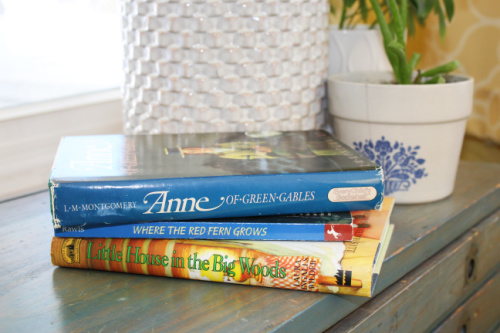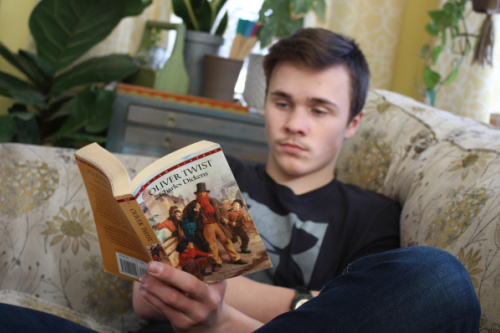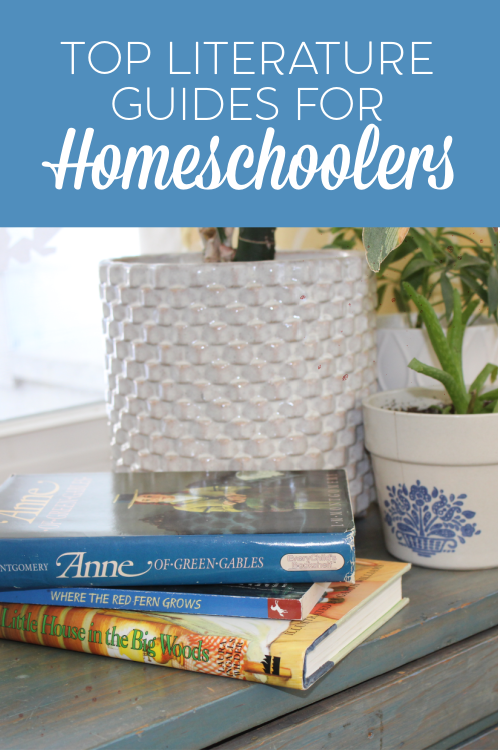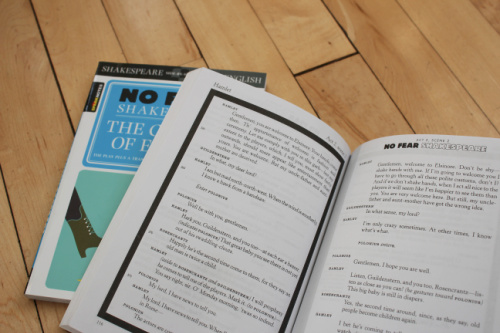According to the Pew Research Center, the number of kids who are reading just for fun is at the lowest it's been since 1984. Kids aren't reading for the sheer enjoyment of reading anymore.
I would argue that it's because we've trained them to hate books. In our proclivity to drill and kill with worksheets in order that we might have concrete written proof that they've not only read the material but that they fully understand it, we've turned pleasure reading into an assignment. It's no longer fun anymore.
(This post contains affiliate links. Please see my disclosure policy for full details.)
Instead of just asking thought-provoking questions during a real-life conversation, we opt for a full academic probe.
Should a child learn the skills of literary analysis? Yes. Should he learn how to adequately articulate his opinions about a particular work of literature? You bet! Does the development of his reading comprehension require formal instruction? Not always, but sometimes.
Over the years, I've been asked by many moms if I'd point them in a safe direction--provide them with a list of GO TO literature guides that will help teach the skills of textual criticism and comprehension without completely sacrificing their child's love of reading. These are moms who find value in the works of the literary greats like Shakespeare and Tolkien but who may not always feel equipped to squeeze the most learning out of a classic. These are moms who lead tween/teen book clubs and who prefer not to invent the wheel every month. These are moms whose kids have consistently scored low on the reading comprehension portion of their state-mandated achievement tests.
So, I've gathered a list of the top literature guides on the market--resources that not only explain a difficult-to-understand text but also include insightful questions and ideas for enrichment activities to help bring the stories to life. And here they are...
Homeschool specific literature guides
Progeny Press- This is an entire curriculum of literature study guides written from a Christian perspective. The featured books range in reading levels/genres from illustrated chapter books to literary classics.
Memoria Press- These are literature guides for all ages that are specifically geared to the classical method of education.
Total Language Plus Study Guides- These are guides for both classic and contemporary novels that range in reading levels from middle-grade to YA.
Guides designed for traditional classroom/group use
The following is a list of consumable workbook-type guides that are designed to be reproduced for a traditional classroom setting but that work well for co-ops or book clubs too.
Classic Complete Literature Sets
Additional resources for literary analysis
Learning Language Arts Through Literature- This is the language arts curriculum I use for my 3rd-8th graders that teaches grammar, spelling, vocabulary, expository writing, and logic through the analysis of middle-grade novels like The Courage of Sarah Noble by Alice Dalgliesh, Number the Stars by Lois Lowry, and The Mysterious Benedict Society by Trenton Lee Stewart. (Please note: Although the curriculum spans from 1st through 12th grade, I prefer to use it only for 3rd through 8th.)
No Fear Shakespeare- These are side-by-side style books that provide the original Shakespearean text on the left-hand side of the page and a simplified translation on the right-hand side. They make understanding the archaic language and the major plot points so much easier for a 21st-century reader. Please note: Not all of the swear words of the original plays have been changed or deleted in these abridged versions.
Spark Notes- This is a website that provides free online guides for hundreds of classic and contemporary works for all age levels from elementary to college and beyond.
Christian Guides to the Classics- These are free online courses that dissect dozens and dozens of classic books through a lens of Scripture.
Children have two vocabularies--their receptive vocabulary (words that they can understand when they hear them said by others) and their expressive vocabulary (words that they can use themselves in their proper context). Books expand both.
A literature guide, while not always necessary, can be a helpful tool for teaching a child to think critically about what he is reading and for broadening his vocabulary. It can provide direction and act as a kind companion for the mom who never learned the skills of literary analysis herself or who does not have a strong background in the classics.
In truth, all that is needed to develop a love of great books is a great book. But then again, sometimes a study guide can be the set of training wheels a young reader needs to jump-start a lifetime of independent pleasure reading.







Thank you for your post about literature guides, Jamie. I have used a number of different guides over the years. Have you ever looked at the lit. and writing guides by 7 Sisters? I love that their guides don't contain a lot of busywork.
ReplyDeleteOoh, sorry. I forgot to include my name in my comment about the 7 Sisters guides.
ReplyDeleteJennifer, I've not used the 7 Sisters guides, but thank you for the suggestion. I'll have to check them out.
DeleteWell this is really helpful! I was actually waiting for you to post an "ask me anything" to ask if you assign reading to your children that read all the time? My daughter reads all day long. My son reads often but not with as much vigor. I may have to try one of these out and maybe tweak it to work for us as we use IEW already for writing, spelling and grammar.
ReplyDeleteThe guides are almost all exclusive to literature although I'm sure they'd provide additional review of writing, spelling, and grammar within the exercises.
DeleteThis is where I am at. My daughter who once struggled to read is reading without my prompting and with joy. I am tempted to order a literary guide but do not want to ruin squelch this desire. I have looked at Memoria Press. She chooses books out of our library which usually include previous read alouds. I am torn.
ReplyDeleteSince you use LLATL for grades 3rd-8th only, can you share what language arts curriculum you use for High School?
ReplyDeleteI use BJU Grammar for high school.
DeleteThank you!!
DeleteI discovered the literature guides from Veritas Press this year and have been very impressed.
ReplyDeleteGood to know. Thank you for sharing!
Delete